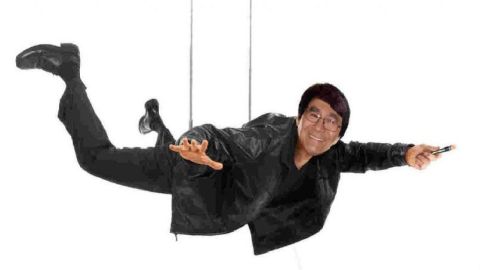Ego Check: You Are Not a Brand

“I wouldn’t call myself humble,” says former Apple evangelist, venture capitalist and author Guy Kawasaki. And yet, thinking too much about your personal brand is “a slippery slope toward egomania,” he says. In this video, Kawasaki shares a particularly humbling experience that brought his ego back in check at a time in his life when he thought “I have truly arrived.”
Watch the video here:
What’s the Big Idea?
In this age of the rock star CEO, many young people hope to emulate corporate idols the way they once worshiped a guitar hero like Jimi Hendrix. In some cases, the CEO’s cult of personality is so inextricably linked to the company’s brand that stakeholders worry about say, Facebook sans Mark Zuckerberg, or much more ominously, Apple without Steve Jobs.
Guy Kawasaki worked with Steve Jobs, and says there is danger in thinking Apple’s example can be easily replicated. To use a hockey analogy, Kawasaki suggests that emulating Jobs “would be like every kid in Canada saying ‘I’m going to be the next Wayne Gretsky.” Not only can we not all be Steve Jobs or Wayne Gretsky, Kawasaki tells Big Think it’s just not a good strategy to think of yourself as a brand:
“When you have this kind of perspective that you’ve arrived, that you have established a brand,” he says, “that’s a really slippery slope toward egomania.”
What’s the Significance?
We wouldn’t be talking about personal branding if it weren’t for the rise of social media. Many argue today that the mastery of social media and the art of personal branding is essential for career success. Essential, yes — depending on your industry. But do we also spend too much time harping on the subject? Probably. At least that is Guy Kawasaki’s assessment.
One can make the argument that personal branding is not only important for people like Steve Jobs, but anyone with a Facebook account. But that point can be taken to the extreme, and that is what Kawasaki says is unhealthy.
On the other hand, the hero-worship we see of men like Steve Jobs is actually based on a well-founded belief that individuals like him possess extraordinary vision. And the power of the vision of a Steve Jobs, combined with the force of his personality, is what created a culture of innovation at Apple.
Unless you’re one of a handful of people who Kawasaki says “may be the next Steve Jobs, or Wayne Gretsky,” Kawasaki advises you to not waste too much time worrying about your personal brand. Most likely you’re just some guy driving around in a Porsche who someone might mistake for Jackie Chan.





